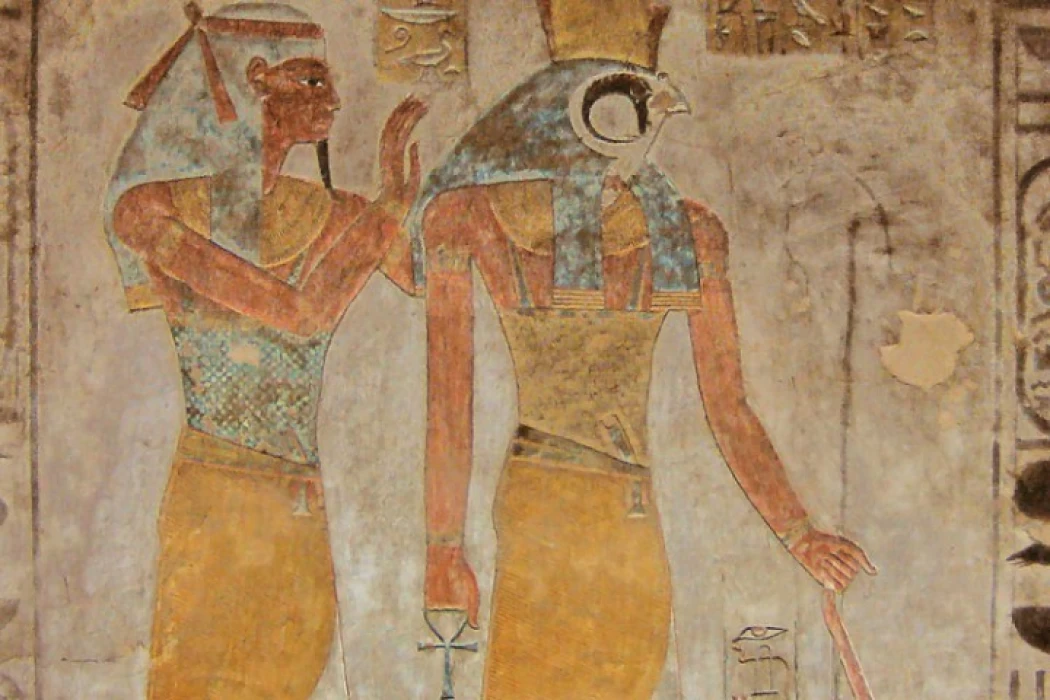
大地之神
神格布
格布被认为是埃及诸神的王子,这个神象征着生育是生命的开始。 另一方面,它负责供应地下发现的矿物和宝石。
神是由一个绿色皮肤的人代表的,它的颜色象征着尼罗河的土地,植被和生命,它的头上还有一只鹅,因为这只鸟是它的化身。
他的父母是特福努特和舒,他们给了他王位,让他成为继承人,在阿波菲斯的阴谋之后,阿波菲斯是一条代表邪恶的蛇,这使他成为第三个法老。
大地之神
格布有一个名叫螺母的姐姐,他是他的妻子,这个联盟代表了组成太阳神的夫妇之一,从这种关系中诞生了四个孩子:奥西里斯,伊西斯,塞斯和尼弗提。
地神,也可以发现躺在地上,他勃起的阴茎,试图达到他的妻子没有胜利,因为他的父亲负责分开他们,舒可以看到在两者中间,代表山谷和山脉,使他们远离。
通过统治黑社会,格布负责俘虏那些不仅仅是正义的灵魂,代表石棺盒子,而螺母则是它的封面,从而化身天堂之门的守护者。
Geb was considered the prince of the Egyptian gods, this deity symbolized fertility as being the beginning of life. On the other hand, it was responsible for supplying the minerals and precious stones found underground.
The deity was represented by a man with green skin, its color symbolized the land of the Nile, the vegetation, and life, it was also visualized with a goose on its head since this bird is its personification.
His parents were Tefnut and Shu who gave him the throne leaving him as heir, after the conspiracy by Apophis, who was a serpent who represented evil, which made him the third pharaoh.
Geb had a sister named Nut, who was his wife. This union represented one of the couples that made up the Heliopolitan Ennead, from that relationship, four children were born: Osiris, Isis, Seth, and Nephthys.
The earth god, could also be found lying on the ground with his erect penis, trying to reach his wife without triumph, since his father was in charge of separating them, Shu could be seen in the middle of the two, representing the valleys and mountains that keep them away.
By dominating the underworld, Geb was in charge of keeping captive the souls that had not been just, representing the sarcophagus box, while Nut was the cover of it, thus incarnating the guardian of the gates of heaven.
Geb is shown as a man on the earth, with his sister Nut, the sky goddess, standing atop him and covered in stars. The rest of the scene shows their parents Shu, the air god, raising his arms, and Tefnut, the moisture goddess, mentioned only by name, and the god Ra riding the sun boat.
«Geb» is sometimes depicted in the form of a human carrying a goose on his head, and his name is written in two syllables «goose and man», where the man is pronounced as the letter «b». As for the goose that the ancient Egyptians chose to write the name «Jeb», it is a Nile goose that was domesticated by the ancient Egyptians in the early days.
The god «Geb» had beneficial qualities and characteristics, as green grains came out of his rib, and plants grew on his back. «Geb» was the source of fresh water, and the source of everything the earth produced, so it was directly linked to the fertility of the earth and the gate.
The power of «Geb» sometimes had harmful aspects, as earthquakes occur when he laughs, and he can prevent his blessings in times of drought, or in arid regions, and because of its importance as a distress to the earth, it may represent a grave.
«Geb» was depicted in many scenes and inscriptions in temples, and it was also associated with some characteristics of popular religion, as it was associated with healing, and its ability to heal was great, so it was supplicated to in some paragraphs in order to heal from a scorpion sting.
Although he did not have a major cult or belief of his own, he was depicted in many scenes and inscriptions in temples, and was also associated with some characteristics of popular religion, as he was associated with healing, and his ability to heal was great, so he was supplicated to in some paragraphs in order to heal from Scorpion sting.














